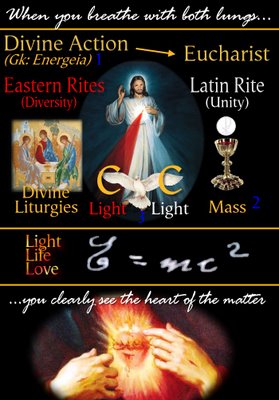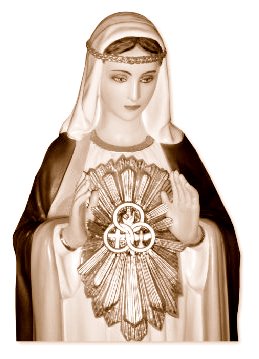Here are a few recent online finds:
(1) The Father as the Source of the Whole Trinity: The Procession of the Holy Spirit in Greek and Latin Traditions
by Pontifical Council for Promoting Christian Unity
(From the meeting in Munich, July 6, 1982)
The
original character of the person of the Spirit as eternal Gift of the
Father's love for his beloved Son shows that the Spirit, while coming
from the Son in his mission, is the one who brings human beings into
Christ's filial relationship to his Father, for this relationship finds
only in him its Trinitarian character: "God has sent the Spirit of his
Son into our hearts, crying Abba!Father!" (Gal 4:6). In the
mystery of salvation and in the life of the church, the Spirit,
therefore, does much more than prolong the work of the Son. In fact,
whatever Christ has instituted — Revelation, the church, the sacraments,
the apostolic ministry, and its magisterium — calls for constant
invocation (epiclesis) of the Holy Spirit and his action (energeia),
so that the love that "never ends" (1 Cor 13:8) may be made manifest in
the communion of the saints with the life of the Trinity. - See
more at:
http://webcache.googleusercontent.com/search?q=cache:1cjg_r5FkIEJ:www.catholicculture.org/culture/library/view.cfm%3Fid%3D1176+&cd=42&hl=en&ct=clnk&gl=us#sthash.jPX9Jij4.dpuf
The
original character of the person of the Spirit as eternal Gift of the
Father's love for his beloved Son shows that the Spirit, while coming
from the Son in his mission, is the one who brings human beings into
Christ's filial relationship to his Father, for this relationship finds
only in him its Trinitarian character: "God has sent the Spirit of his
Son into our hearts, crying Abba!Father!" (Gal 4:6). In the
mystery of salvation and in the life of the church, the Spirit,
therefore, does much more than prolong the work of the Son. In fact,
whatever Christ has instituted — Revelation, the church, the sacraments,
the apostolic ministry, and its magisterium — calls for constant
invocation (epiclesis) of the Holy Spirit and his action (energeia),
so that the love that "never ends" (1 Cor 13:8) may be made manifest in
the communion of the saints with the life of the Trinity. - See
more at:
http://webcache.googleusercontent.com/search?q=cache:1cjg_r5FkIEJ:www.catholicculture.org/culture/library/view.cfm%3Fid%3D1176+&cd=42&hl=en&ct=clnk&gl=us#sthash.qk6e0l9x.dpuf
The original character of the person of the Spirit as eternal Gift of the Father's love for his beloved Son shows that the Spirit, while coming from the Son in his mission, is the one who brings human beings into Christ's filial relationship to his Father, for this relationship finds only in him its Trinitarian character: "God has sent the Spirit of his Son into our hearts, crying Abba!Father!" (Gal 4:6). In the mystery of salvation and in the life of the church, the Spirit, therefore, does much more than prolong the work of the Son. In fact, whatever Christ has instituted—Revelation, the church, the sacraments, the apostolic ministry, and its magisterium—calls for constant invocation (epiclesis) of the Holy Spirit and his action (energeia), so that the love that "never ends" (1 Cor 13:8) may be made manifest in the communion of the saints with the life of the Trinity.
The
original character of the person of the Spirit as eternal Gift of the
Father's love for his beloved Son shows that the Spirit, while coming
from the Son in his mission, is the one who brings human beings into
Christ's filial relationship to his Father, for this relationship finds
only in him its Trinitarian character: "God has sent the Spirit of his
Son into our hearts, crying Abba!Father!" (Gal 4:6). In the
mystery of salvation and in the life of the church, the Spirit,
therefore, does much more than prolong the work of the Son. In fact,
whatever Christ has instituted — Revelation, the church, the sacraments,
the apostolic ministry, and its magisterium — calls for constant
invocation (epiclesis) of the Holy Spirit and his action (energeia),
so that the love that "never ends" (1 Cor 13:8) may be made manifest in
the communion of the saints with the life of the Trinity. - See
more at:
http://webcache.googleusercontent.com/search?q=cache:1cjg_r5FkIEJ:www.catholicculture.org/culture/library/view.cfm%3Fid%3D1176+&cd=42&hl=en&ct=clnk&gl=us#sthash.qk6e0l9x.dpuf
+ + +
The
original character of the person of the Spirit as eternal Gift of the
Father's love for his beloved Son shows that the Spirit, while coming
from the Son in his mission, is the one who brings human beings into
Christ's filial relationship to his Father, for this relationship finds
only in him its Trinitarian character: "God has sent the Spirit of his
Son into our hearts, crying Abba!Father!" (Gal 4:6). In the
mystery of salvation and in the life of the church, the Spirit,
therefore, does much more than prolong the work of the Son. In fact,
whatever Christ has instituted — Revelation, the church, the sacraments,
the apostolic ministry, and its magisterium — calls for constant
invocation (epiclesis) of the Holy Spirit and his action (energeia),
so that the love that "never ends" (1 Cor 13:8) may be made manifest in
the communion of the saints with the life of the Trinity. - See
more at:
http://webcache.googleusercontent.com/search?q=cache:1cjg_r5FkIEJ:www.catholicculture.org/culture/library/view.cfm%3Fid%3D1176+&cd=42&hl=en&ct=clnk&gl=us#sthash.jPX9Jij4.dpuf
...Jesus Christ instituted the Sacrament of His Precious Body and Blood, the Fifth Mystery of Light, the Holy Eucharist at The Last Supper and it calls for constant Divine Action of the Holy Spirit (energeia) so that eternal life and love are made manifest in Holy Communion both in the Mass of the Marriage Supper of the Lamb in Heaven and here on earth.
_______________
(3) Two Divergent Triadologies?
Anatomizing Divinity
by James L. Kelley
This
spiritual heart is man’s
unique organ of communion
with the uncreated energies
of God. These energein of
God are not a part of
God, nor are they an
intermediary between man and
God. Neither are God’s
energies anything other than
the very Life, Light, and
Love of the Father, Son and
Holy Spirit. These energies
are God’s going out of
Himself toward creation in
an act of love (kenosis, self-emptying)
to save creation from
corruption through communion
with His incorrupt life. The
recipient of God’s energies
does not receive a part of
God, because God is not
composite, but rather man
receives the body of Christ,
which is a
mystico-noetic—and for that
very reason eminently realistic—communication
of the life of the Holy
Trinity. Nor
are the divine energies anhypostatic, but rather are
the true resplendence of
God, distinguished from the
divine essence but not
separate from it.
+ + +
...it takes an undivided heart to see the Truth of what is in essence, an undivided Church. The Holy Eucharist is the source and summit of this communion, the one constant that effects true conversion through, with and in Jesus Christ. We need this insight about God's energeia from our Orthodox brothers to complete the picture—to breathe with both lungs.
Is it any wonder
that Albert Einstein
called celeritas squared
c2 the conversion constant?




























No comments:
Post a Comment